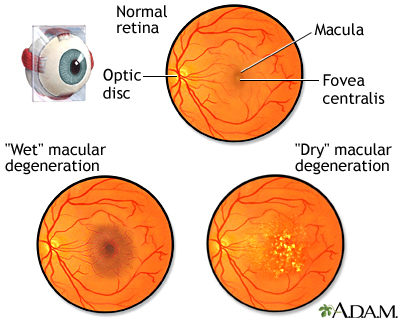Macular Degeneration

What is Macular Degeneration?
Macular degeneration is a prevalent eye condition that progressively damages the macula, the tiny central part of the retina responsible for sharp, central vision. Commonly age-related and affecting individuals over 60 years old, the disease is thus referred to as Age-Related Macular Degeneration (AMD). It manifests in two forms: dry (atrophic) and wet (exudative).
Who’s at risk for Macular Degeneration?
AMD predominantly affects older adults, with the risk increasing with age. Other risk factors include a family history of AMD, smoking, obesity, high blood pressure, and high cholesterol. It has been noted that those of Caucasian descent are more susceptible to AMD than other ethnic groups.
What causes Macular Degeneration?
The exact cause of AMD remains somewhat nebulous but appears to be a mix of genetic and environmental factors.
How does Macular Degeneration start?
The onset of AMD involves the aging and thinning of macular tissues, the depositing of drusen (yellow deposits beneath the retina), or the growth of abnormal blood vessels under the retina.
What are the symptoms of Macular Degeneration?
Symptoms of AMD often include gradually worsening visual acuity, leading to a blurry or distorted vision, and difficulties reading or recognizing faces. A common early sign is a distorted perception of straight lines, which appear wavy.
How is Macular Degeneration diagnosed?
AMD is typically diagnosed using a comprehensive eye exam that may include a visual acuity test, a dilated eye exam, and optical coherence tomography (OCT). Another common diagnostic test is the Amsler grid, which helps identify distortions in your central vision.
How can Macular Degeneration be treated?
Treatment for AMD varies depending on its type. While there is no cure for dry AMD, steps can be taken to slow its progression, like taking specific vitamin and mineral supplements. Wet AMD can be treated with anti-VEGF drugs, laser therapy, or photodynamic therapy.
What complications may occur with Macular Degeneration?
AMD can lead to severe visual impairment and even blindness in advanced stages. It can also significantly impact one's quality of life by hindering the ability to drive, read, recognize faces, or perform other detailed tasks.
How can I prevent Macular Degeneration?
While you can't prevent AMD entirely, you can reduce your risk by quitting smoking, maintaining a healthy weight, controlling blood pressure and cholesterol levels, exercising regularly, and eating a diet rich in fruits, vegetables, and fish.
Long-term management of Macular Degeneration
Long-term management of AMD includes regular eye exams to monitor progression, maintaining a healthy lifestyle, and using low vision aids and services to help with visual impairment.
What is recent research saying about Macular Degeneration?
Recent research is exploring potential treatments, including stem cell therapy, gene therapy, and new medications. For example, studies are examining the potential for stem cells to replace damaged cells in the retina.
Where can I go for more information on Macular Degeneration?
For more information on AMD, consider reaching out to reputable health organizations like the American Academy of Ophthalmology (AAO), the American Macular Degeneration Foundation (AMDF), or the National Eye Institute (NEI).

